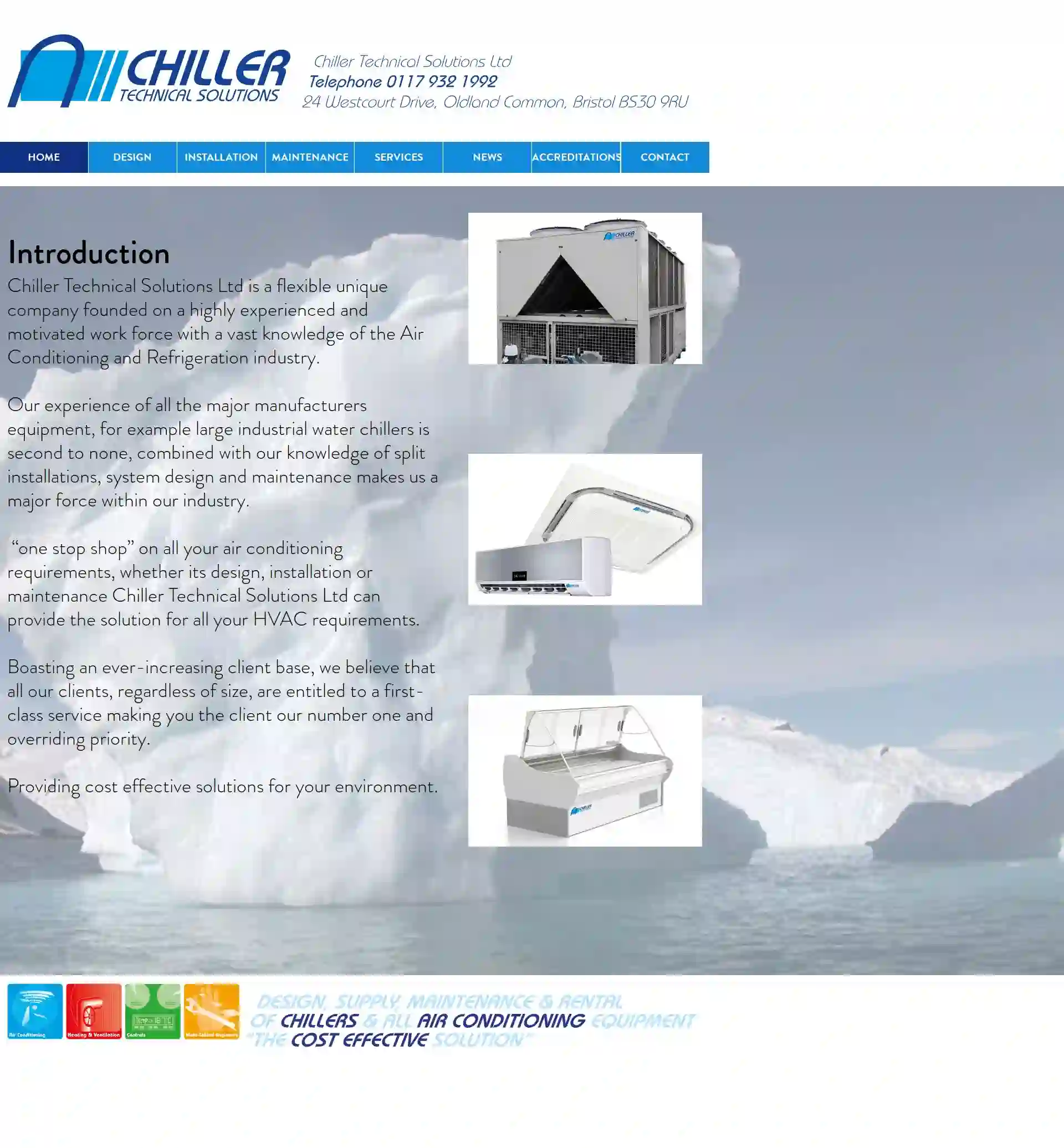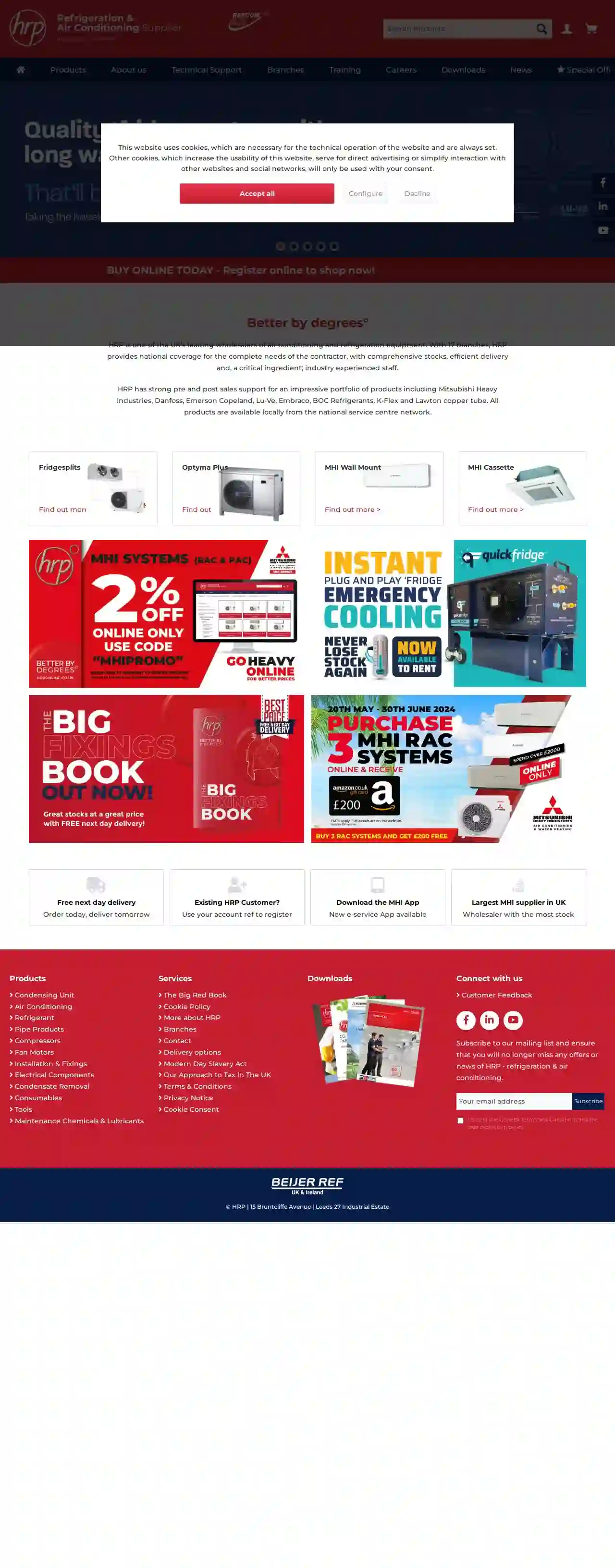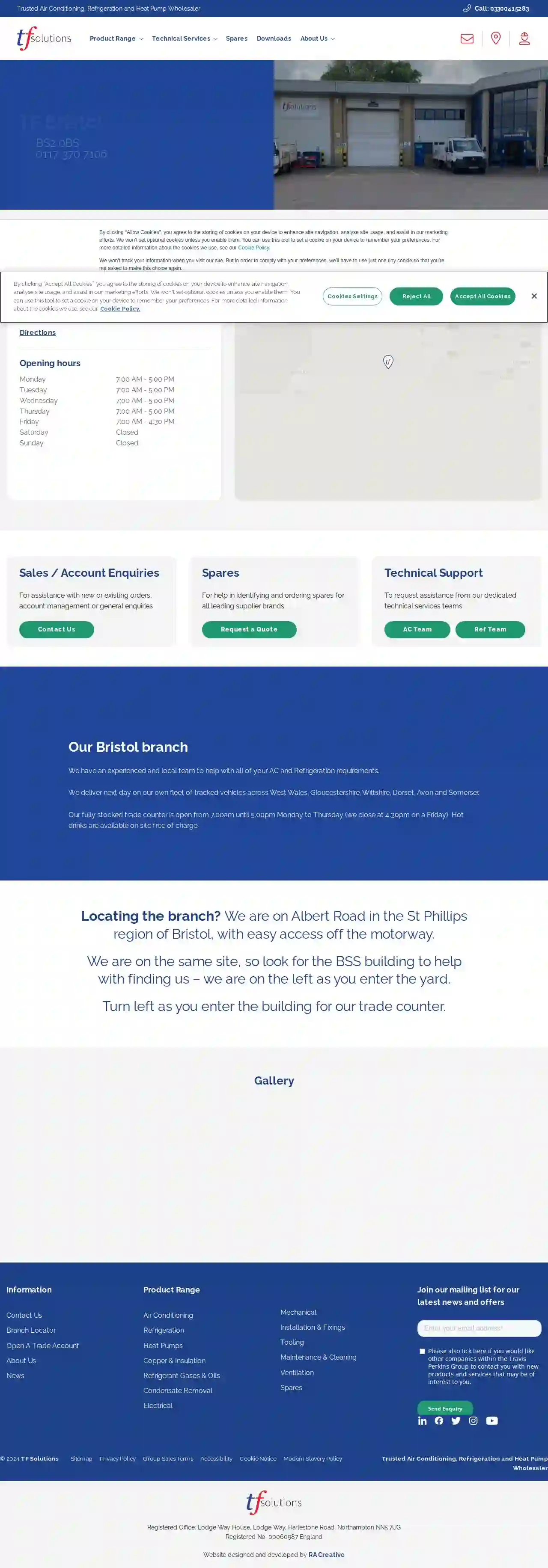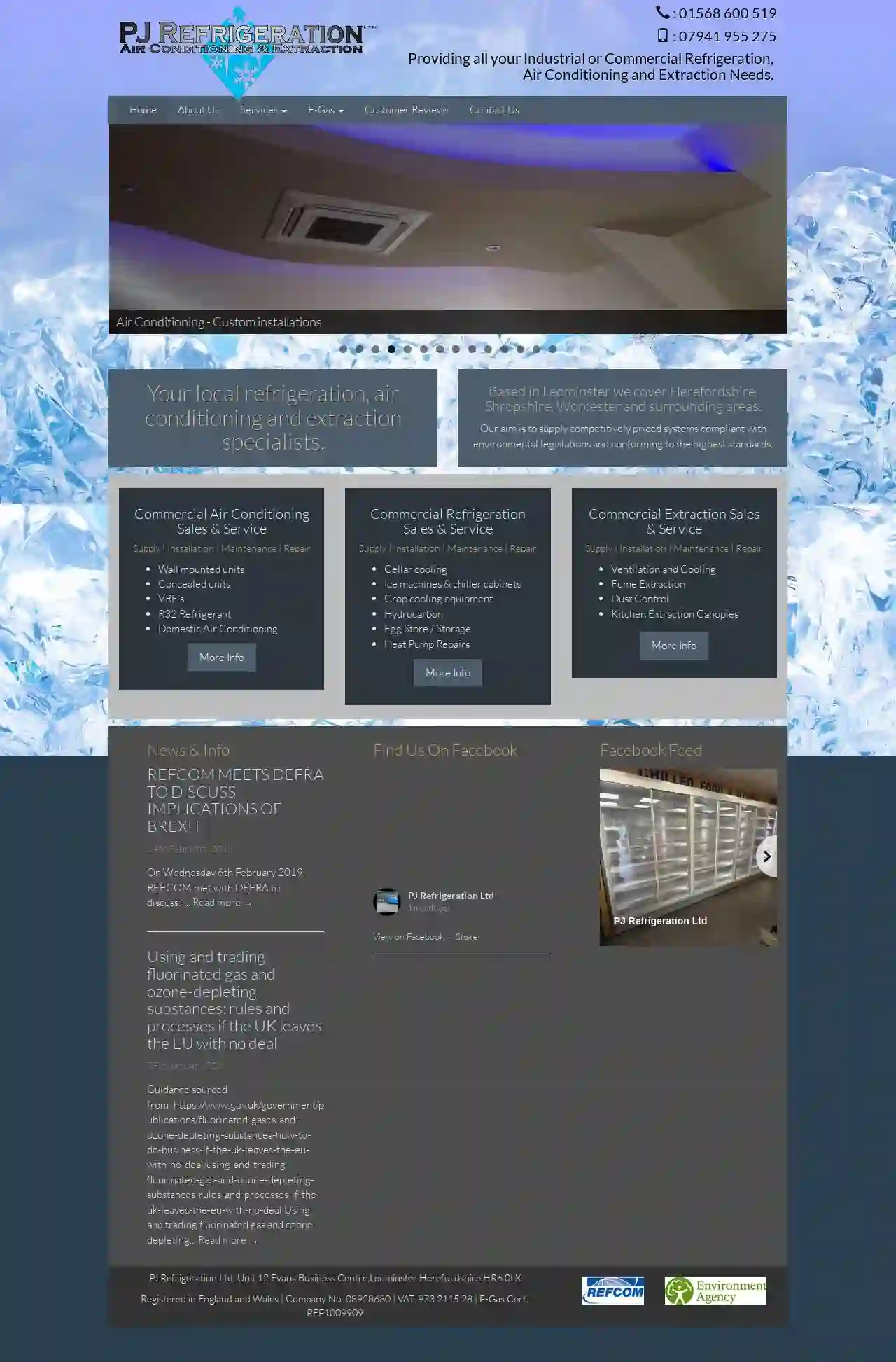Emergency HVAC Monmouth
Top 10 24/7 HVAC Repair in Monmouth
Receive 3 FREE Emergency Furnace Repair quotes for your project today! Compare profiles, reviews, accreditations, portfolio, etc... and choose the best service.

Chiller Technical Solutions Ltd
32 reviewsOldland Common, 24 Westcourt Drive, Bristol, BS30 9RU, GBChiller Technical Solutions Ltd is a flexible unique company founded on a highly experienced and motivated work force with a vast knowledge of the Air Conditioning and Refrigeration industry. Our experience of all the major manufacturers equipment, for example large industrial water chillers is second to none, combined with our knowledge of split installations, system design and maintenance makes us a major force within our industry. “one stop shop” on all your air conditioning requirements, whether its design, installation or maintenance Chiller Technical Solutions Ltd can provide the solution for all your HVAC requirements. Boasting an ever-increasing client base, we believe that all our clients, regardless of size, are entitled to a first-class service making you the client our number one and overriding priority. Providing cost effective solutions for your environment.
- Services
- Why Us?
- Gallery
Get Quote
Merretts Heating Services
3.919 reviewsElmtree Farm, Bath Road, Frocester, GL10 3TG, GBMerretts Heating Services has been running since 1982, after David Merrett left the Royal Engineers to join his father Bob Merrett in the business. The company has grown from a ‘man in a van’ with an office in David’s living room, to a fleet of fifteen engineers with six office staff and a designated parts manager. Covering a wide area from Bristol to Tewkesbury, Lydney to Fairford, Merretts Heating also covers a wide range of needs. Servicing oil, gas and LPG fired boilers, dealing with breakdowns of all kinds, installations of boilers and water cylinders as well as taking care of your plumbing needs and much more. The Company has excelled, winning Stroud Life Family Business of the year in 2012, followed by winning small business of the year and outstanding contribution to apprenticeships in Gloucestershire at the 2018 Gloucestershire Apprenticeship Awards. The company is a long-standing Diamond Accredited Installer of Worcester Bosch boilers, and is highly respected within Gloucestershire for providing efficient service with a broad reach of expertise. At Merretts Heating services our qualified and experienced engineers work closely with our major suppliers which include manufacturers such as Worcester Bosch, Grant, Rayburn, Ideal, Vaillant and all other major brands. We are a Gas Safe and Oftec registered company and all our engineers are regularly trained to the latest industry regulations and standards. We are an accredited installer with Worcester Bosch and can offer up to a 10 year guarantee. “We have used Merretts for 9 years to service our boiler. Engineers always arrive within the promised time, and are always professional. good communication. Very happy with the service.” Service contracts are available starting from just £8.50 per month. Call our friendly office staff and talk to Helen, Karen, Suzi and Michelle and let us see if we can make your heating system ‘A Degree Above the Rest’!
- Services
- Why Us?
- Accreditations
- Our Team
- Testimonials
- Gallery
Get Quote
Zeal Services
4.956 reviews11 Elmleigh Avenue, Bristol, BS16 9ER, GBPreviously known as Parr and Evans Heating, Zeal Services is an independent, family run plumbing and heating Bristol based company priding itself on the reliable, high quality plumbing and heating services in the South West. With over 20 years of experience, Zeal Services’ Plumbing and Heating provide Bristol & Bath’s leading home improvement services, with a team of highly-trained professionals at your fingertips. We specialise in creating beautifully-finished bathroom transformations of all scopes. Our top priority is making sure we carry out the services you need right away the first time. With excellent workmanship over the years, we can guarantee to deliver the best quality plumbing and heating works and as always, you can only expect a quick clean service from our reliable plumbing and heating Bristol based technicians and engineers to service homes throughout the South West.
- Services
- Why Us?
- Accreditations
- Our Team
- Testimonials
- Gallery
Get Quote
Paone Mechanical Inc.
556 reviewsGloucester, GBTrust In Paone Mechanical With Paone Mechanical your home comfort is on time and on budget. Paone Mechanical has provided Gloucester, MA & surrounding areas with quality residential & commercial HVAC services since 2001. Request Your Free Estimate Financing Options ASK US ABOUT MASS SAVE REBATES! $10,000 available when you switch your whole home heat source to heat pumps or $1,250 per ton up to $10,000. New Heat Pump System Installed As low as $99/mo. Cannot be combined with other offers. Restrictions may apply. More Info iWaveR Air Cleaner - $950, save $300 Reduce air borne viruses and bacterias in your home. Cannot be combined with other offers. Restrictions may apply. More Info AC System Tune-Up $99/per system. Reg Price: $150 Cannot be combined with other offers. Restrictions may apply. More Info Schedule A Repair No matter what make or model, our highly trained team will be able to help ensure your system is running effectively and efficiently. More Info Upgrade Your System We install only the best, and most affordable systems. Click below to learn about our financing options, or fill out the form to get started! More Info Request Maintenance We offer a comprehensive maintenance program that can be customized to your needs. Call us at (978) 228-5230 to learn more. More Info Quick Form No need to wait! Simply click on one the the services to the side, or choose a service from the list below and hit send. One of our specialists will be in touch ASAP. Your Name* Your PhoneYour Email Address* How Can We Help?*Please Select An Option...ServiceInstallationRepairOther What Makes Us Different? Click To Find Out On Time and On Budget For top of the line residential and commercial HVAC services in Gloucester, MA & surrounding areas, call on the professionals from Paone Mechanical. We offer a complete range of heating, ventilation, air conditioning, and refrigeration options, including installation, repair, and maintenance of all makes and models. Family owned and operated, we prioritize higher quality work, tailoring our recommendations to the customer’s needs and goals. Our small team of technicians creates a family-oriented, boutique style atmosphere, translating into more personalized attention and superior rewards. Get in touch with Paone Mechanical for a free estimate anywhere throughout Gloucester, Essex, Rockport, Manchester-by-the-Sea, Ipswich, Hamilton, Wenham & Beverly, MA. We encourage you to browse our broad spectrum of services, take advantage of our dedication to satisfaction
- Services
- Why Us?
- Accreditations
- Our Team
- Testimonials
- Gallery
Get Quote
B Palmer Plumbing & Heating
32 reviews6 The Walk, Wotton-under-Edge, GL12 8RP, GBB Palmer Plumbing & Heating is a local business serving Wotton under Edge, Stroud and Gloucestershire. We offer a range of plumbing and heating services, including shower installations, pressurised hot water cylinders, bathroom installations, burst pipes and leaks, and wet rooms. We are committed to providing high-quality workmanship and excellent customer service.
- Services
- Why Us?
- Accreditations
- Gallery
Get Quote
HRP
4.58 reviewsBristol, GBTrading since 1945, HRP is one of the longest established refrigeration and air conditioning wholesalers in the UK. Learn more about our company history and mission.
- Services
- Why Us?
- Gallery
Get Quote
TF Solutions, Bristol
32 reviewsAlbert Rd, Bristol, BS2 0BS, GB- Services
- Why Us?
- Gallery
Get Quote
PJ Refrigeration Ltd
52 reviewsUnit 12 Evans Business Centre, Leominster, HR6 0LX, GBPJ Refrigeration Ltd is your local expert for all your Industrial or Commercial Refrigeration, Air Conditioning and Extraction needs. Based in Leominster, we cover Herefordshire, Shropshire, Worcester and surrounding areas. Our aim is to supply competitively priced systems compliant with environmental legislations and conforming to the highest standards. We offer a comprehensive range of services, including: Commercial Air Conditioning Sales & Service: Supply, Installation, Maintenance & Repair Commercial Refrigeration Sales & Service: Supply, Installation, Maintenance & Repair Commercial Extraction Sales & Service: Supply, Installation, Maintenance & Repair Our team of experienced engineers is dedicated to providing you with the best possible service. We use only the highest quality materials and equipment to ensure that your system is reliable and efficient. Contact us today for a free quote.
- Services
- Why Us?
- Gallery
Get Quote
Watkins D V Ltd
58 reviewsThe Willows, Newtown Lane, Leominster, HR6 8QD, GBBased near Leominster, Herefordshire, we have been established since 1987. We have grown to become one of the most successful leading plumbing and heating engineering companies in the Herefordshire, Worcestershire and Shropshire area. We cover both domestic and commercial requirements with most of our work coming directly from personal recommendations, builders and architects. Our services include gas, oil, solid fuel, solar and ground pump installations as well as maintenance, servicing and repairs. Our staff are highly trained and qualified to carry out design, estimating and installation.
- Services
- Why Us?
- Gallery
Get Quote
Boiler Installation Hereford
Eign Hill, Hereford, HR4 0AA, GBBoiler Installation In HerefordHereford offer boiler installation services, are sitauted not far from Eign Hill in Hereford, serving businesses in Hereford and customers in Herefordshire. Boiler Installation In Hereford in Hereford, Herefordshire offering gas boiler installation, combi boiler installation cost and boiler flue installation regulations services. Boiler Installation In Hereford offer boiler installation services such as, boiler installation cost in Hereford, boiler installation near me in Hereford and combi boiler prices and installation in Hereford, Herefordshire, in the the West Midlands of England. Boiler Installation In Hereford help customers round-the-clock.
- Services
- Why Us?
- Gallery
Get Quote
Over 12,692+ HVAC Businesses in our network
Our HVAC experts operate in Monmouth & surrounding areas!
HVACCompaniesHub has curated and vetted the Best HVAC Companies near Monmouth. Find a reliable pro today.
Frequently Asked Questions About Emergency HVAC Services
- Insulate Pipes: Insulate exposed pipes in unheated areas, such as crawl spaces, attics, and garages.
- Seal Air Leaks: Seal air leaks and cracks in walls and foundations near pipes.
- Keep Thermostat Consistent: Maintain a consistent thermostat setting, even when you are away, to keep indoor temperatures above freezing.
- Open Cabinet Doors: Open cabinet doors under sinks to allow warmer air to circulate around pipes.
- Let Faucets Drip: During freezing temperatures, allow cold water taps to drip slowly to relieve pressure and prevent pipes from bursting.
- Raise Your Thermostat: Set your thermostat to a higher temperature when you’re away. Consider using a programmable or smart thermostat.
- Use Fans: Fans can circulate air and make you feel cooler, even at a higher thermostat setting.
- Close Window Coverings: Keep curtains or blinds closed during the day to block out sunlight.
- Limit Heat-Generating Activities: Avoid running heat-producing appliances (ovens, dryers) during the hottest parts of the day.
- Annual AC Maintenance: Schedule yearly maintenance for your air conditioner to ensure it's running efficiently.
- Plant Shade Trees: Planting trees around your home can provide natural shade and reduce heat gain.
- MERV Rating: The Minimum Efficiency Reporting Value (MERV) indicates the filter's ability to trap particles. Higher MERV ratings mean better filtration.
- Filter Size: Make sure you select the correct size filter for your HVAC unit.
- Filter Type: Different types of filters are available, including pleated filters, HEPA filters, and electrostatic filters.
- Your Needs: Consider your indoor air quality needs. If you have allergies or pets, a higher MERV filter may be beneficial.
How can I prevent frozen pipes in the winter?
What is carbon monoxide, and how can it affect my HVAC system?
How can I cool my home efficiently?
How do I choose the right HVAC filter?
How can I prevent frozen pipes in the winter?
- Insulate Pipes: Insulate exposed pipes in unheated areas, such as crawl spaces, attics, and garages.
- Seal Air Leaks: Seal air leaks and cracks in walls and foundations near pipes.
- Keep Thermostat Consistent: Maintain a consistent thermostat setting, even when you are away, to keep indoor temperatures above freezing.
- Open Cabinet Doors: Open cabinet doors under sinks to allow warmer air to circulate around pipes.
- Let Faucets Drip: During extremely cold weather, allow cold water taps to drip slightly to keep water moving and prevent freezing.
What is carbon monoxide, and how can it affect my HVAC system?
How can I cool my home efficiently?
- Raise Your Thermostat: Set your thermostat to a higher temperature when you’re away. Consider using a programmable or smart thermostat.
- Use Fans: Fans can circulate air and make you feel cooler, even at a higher thermostat setting.
- Close Window Coverings: Keep curtains or blinds closed during the day to block out sunlight.
- Limit Heat-Generating Activities: Avoid running heat-producing appliances (ovens, dryers) during the hottest parts of the day.
- Annual AC Maintenance: Schedule yearly maintenance for your air conditioner to ensure it's running efficiently.
- Plant Shade Trees: Planting trees around your home can provide natural shade and reduce heat gain.
How do I choose the right HVAC filter?
- MERV Rating: The Minimum Efficiency Reporting Value (MERV) indicates the filter's ability to trap particles. Higher MERV ratings mean better filtration.
- Filter Size: Make sure you select the correct size filter for your HVAC unit.
- Filter Type: Different types of filters are available, including pleated filters, HEPA filters, and electrostatic filters.
- Your Needs: Consider your indoor air quality needs. If you have allergies or pets, a higher MERV filter may be beneficial.